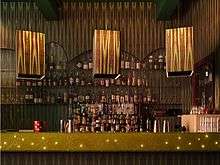Cassandra Fahey
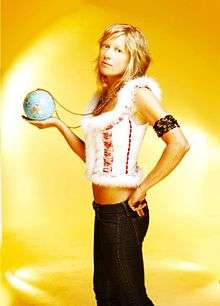
Cassandra Fahey (born c. 1972)[1] is an Australian architect and interior designer residing in Melbourne, Australia. Fahey is Director of the architecture firm "Cassandra Complex". She was put in the public spotlight in 2000 because of her controversial 'Newman House',[1] located in St Kilda, designed for media and football identity Sam Newman. She is also known for her works on the "The Smith Great Aussie Home" and the BHP Billiton Healesville Sanctuary "Platypusary". Her work has received a number of awards as well as being featured in many local and international publications.
Background
Cassandra completed the Bachelor of Architecture at Royal Melbourne Institute of Technology (RMIT) in 1998. During her studies she travelled internationally to produce a documentary on Architects practicing at the turn of the millennium. Among these were Sir Norman Foster, Peter Eisenman, & Jean Nouvel. Whilst in New York she met Richard Serra and was influenced by his sculpture in its original setting in a converted New York City garage. The effect of this can be seen later in the design of her own house, “Chameleon”.[2]
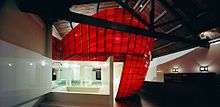
On returning she soon commenced her career under the mentorship of Tom Kovac and registered her own practice which she named Cassandra Complex
Fahey is currently studying a Masters in Contemporary Art at the Victorian College of the Arts in Melbourne.
Architecture and interior design
Fahey's approach to architecture is unique and unlike other architects she looks to change “style” from project to project. Fahey exhibits a range of architectural approaches. This unique attitude has led her to produce a portfolio of architectural works that look vastly different. Her attitude towards design and architecture connects back to her boundary pushing, question asking nature. She seems to be asking: why should I stick to one style? Fahey has also spent time studying art and interior design. This exposure to other courses has helped her develop this idea of "no one way". Designing in multiple disciplines has broadened her knowledge of the different methods of tackling a design problem. This, combined with her mindset of not having to stick to a specific style allows herself to be set free when developing a building and opens her up to a wide range of possible paths that she can go down, leading to a vast amount of possible outcomes for that building. Fahey regards some key influences on her designs as being “so-called nature”, Emily Kame Kngwarreye and the “whole bang lot” and pretty much well anything else.
Notable works
Sam Newman House
Sam Newman House, in St. Kilda West, Melbourne, was finished in 2001. It was nominated for RAIA award for the best New Building in 2003.[3]
Fahey was given an open brief by her client.[4]
The Exterior design of the house was controversial and was dogged by objections and incorrect planning applications. It is called the house that Melbournians love to hate.[3]
It has a 9 m by 8 m Façade made of patterned glass designed by Cassandra and features a mural of Pamela Anderson.[5]
The garage door is designed to open at Pamela’s mouth.[6]
The house which is actually named ‘White Noise’ is inspired from Robert Venturis Term ‘Billboard Façade’. It is actually a most subtle and sophisticated design for a first work, in which post-modernism co-habits seamlessly with minimalism.[5]
The house has been dubbed by Julianna Engberg, curator of Melbourne Festival’s Visual art’s to fit within Australia's fixation on ‘the gigantic’ as in the big pineapple, big banana and now the ‘big pammy’. It is also regarded as pop art and public art by Norman Day, Adjunt professor of Architecture at RMIT university.[5]
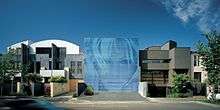
Newman House
Fahey's inspiration for the controversial Newman house was, among other things; Robert Venturi's "Billboard Facade", combining Post-Modernism seamlessly with Minimalism. She tested over 200 patterns to obtain a subtle yet confronting version of the pixelated image of Pamela Anderson. The facade itself is manufactured from laminated Digi-glass and digital film sitting on an aluminum plate grid frame. The site itself is a minute 20 meters by 9 meters which is now occupied by the house on a north-east, south west orientation with the front adjacent to Albert Park. Despite not having completed her university studies at the time of the commission, Fahey was given a fairly open brief including requirements for a sense of privacy, light and an overall exoticism.
BHP Billiton Platypusary
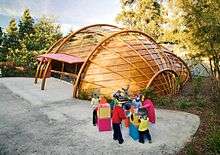
Platypusary at Healsville sanctuary also known as BHP Billiton Platypusary was opened to the public on 12 May 2005.[7]
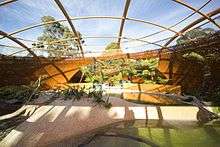
Visualised as a huge platypus egg in bright gold pipes, the platypusary’s façade is made up of gold panels with inscribed leaf shapes. It encloses a ponds of water running like a native creek.[3] The passing of sun over these leaves casts complex shadows and reflections onto the marble ground of the platypusary.[8] The movement of the water through the pools provides different refractions cast upon the gold panels, reiterating the constant connection and reflection. When asked about influences she cites the work of aboriginal painter Emily kame kngwarrey among her key influences.[3] The viewer is encapsulated within the ovuloid, under the exoskeleton, ensuring they too become part of the sparkle motion so that in some strange way they are part of this “awelye”.[8] Awelye represents ceremony in aboriginal culture of Australia.[9] Kame Kngwarrey also labeled her work as “awelye”, “the lot”,”the whole bang lot”.[8]
Smith Great Aussie Home
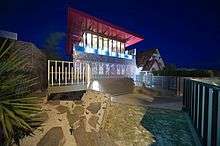
The Smith Great Aussie Home was designed for the self-made businessman Darren Smith. The $1.6 million “trophy home”[1] is located at Black Rock, Melbourne, Victoria.[10]
New Gold Mountain Bar
Designed by Fahey in 2003, New Gold Mountain is a bar located in Melbourne's CBD. Fahey's concept surrounds an old tailors studio on the outskirts of the city's Chinatown district and she has created a space, which replicates the unique theme of an opium den. Throughout the first level a jade washed interior holds more upon closer inspection. Distorted images of opium smokers form repeated patterns, which wallpaper the walls and soft furnishings. Upstairs tantric red wallpaper and sectioned caverns create a strong mood for conversation and company. There are glistening beads, pink opium moments and multi coloured skirts hanging from the ceiling. The bar is a strong testament to Cassandra's talent as an interior architect.
Other notable works
Husk Boutique, Melbourne CBD
Crowning Glory – Monash Museum of Art
Chameleon warehouse conversion, North Melbourne
Josh Abrahams House, Brighton
A bathroom for Jonathan Mills
Oral & Maxillofacial Surgery, Russell St, Melbourne
Breamlea House
Menorah House, Hawthorn (unbuilt)
Awards
- 2007 Bulletin Smart 100 - Best Australian Designer 2007[11]
- 2007 Marion Mahony Interior Architecture Award - New Gold Mountain, Melbourne[12]
- 2007 Residential Architecture – Houses Award - The Smith Great Aussie Home, Blackrock[12]
- 2007 Interior Commendation – National Award - The Smith Great Aussie Home, Blackrock[13]
- 2006 Institutional Architecture Award - BHP Billiton Platypussary, Victoria
- 2006 Commercial Architecture Award - HUSK Collins Street, Melbourne
- 2006 Dulux Color Awards - Chameleon (Warehouse conversion), North Melbourne
- 2004 Residential Architecture Award - Chameleon, North Melbourne
- 2004 The Interior Award – National Award - Chameleon, North Melbourne
- 2004 IDA Interior Design Awards - Chameleon, Refurbished Residential Interior
- 2003 Residential Architecture Award - Sam Newman House, St. Kilda
References
- 1 2 3 "More bang for your building". The Age. 23 April 2006.
- ↑ Amelar, Sarah (September 2005), Architectural Record, 193 (9), pp. 108–115
- 1 2 3 4 "The Age". Melbourne. 23 August 2005.
- ↑ "World Press".
- 1 2 3 "Saint Kilda History Society". Archived from the original on 15 April 2011.
- ↑ "Walking Melbourne Guide".
- ↑ "Legislation Victoria".
- 1 2 3 "Architecture Awards".
- ↑ "Aboriginal Shop". Archived from the original on 12 June 2011.
- ↑ Cassandra Complex, The Smith Great Aussie Home, The RAIA Award for Residential Architecture - Houses, Architecture.com.au, 2010
- ↑ "100 Australia's Best and Brightest". The Bulletin. June 26, 2007.
- 1 2 "2007 Victorian Architecture Awards: Award Winner List". Australian Institute of Architects. Australian Institute of Architects.
- ↑ "AUSTRALIAN INSTITUTE OF ARCHITECTS NATIONAL ARCHITECTURE AWARDS 1981 – 2013" (PDF). Australian Institute of Architects.
External links
- Cassandra Complex (broken link)
- https://web.archive.org/web/20150325190810/http://architecture.rmit.edu.au/About/Alumni_Profiles.php
- http://www.architecturemedia.com/aa/aaissue.php?issueid=200711&article=18&typeon=2
- https://web.archive.org/web/20110410081010/http://www.msd.unimelb.edu.au/events/and-lectures/archives/2004/fahey.html
- https://web.archive.org/web/20101218082942/http://www.thecolour.com.au/tag/cassandra-fahey/
